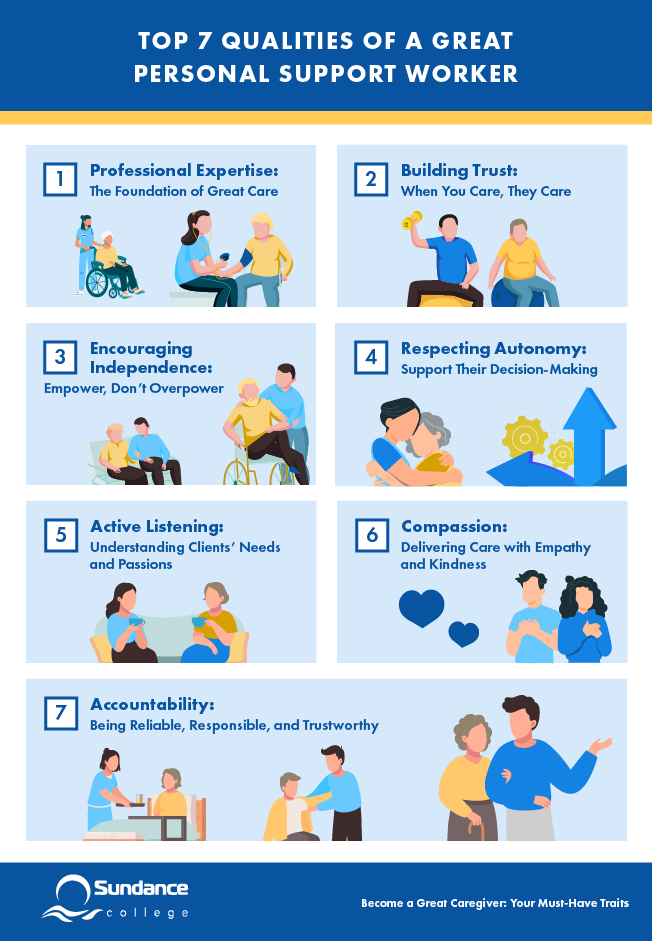Blog / Top 7 Qualities of a Great Personal Support Worker
Top 7 Qualities of a Great Personal Support Worker

Personal Support Worker Diploma
- Personal Aide - Home Support
- Family Caregiver
- Personal Support Worker
- Home Support Worker
Table of Contents
If you had to choose a caregiver for your loved one, who would you trust?
Ask families about their experiences with personal support workers (PSWs) and you’ll hear different stories. One might say, “Our caregiver looked after my dad’s basic needs and was always there to help.” Another might share, “Our support worker gave my mom such compassionate care that it felt like they became part of our family. They made a real difference in her life, and ours, too.”
Both personal support workers have the skills for the job, but it’s the second caregiver’s extraordinary qualities that make their care truly exceptional.
If you’re considering a career as a personal support worker or are already working in the field and want to stand out, this article is for you. It will walk you through seven important qualities that define a truly great personal support worker – and where you can develop them.
Listen to “Top 7 Qualities of a Great Personal Support Worker”
1. Professional Expertise: The Foundation of Great Care
You may be inspired to pursue a caregiving career after helping a family member. While this motivation is genuine and valuable, it’s important to recognize that professional caregiving involves a broader and more complex set of skills and knowledge than an informal caregiving experience provides.
For example, a PSW may work with clients who have a variety of health challenges, from physical disabilities to cognitive conditions. The ability to assess each situation and adapt accordingly is what distinguishes professional expertise. Whether assisting with mobility or offering emotional support during difficult moments, a great PSW knows how to handle diverse situations with confidence.
Formal PSW training equips you to adapt care based on certain client needs, from mobility support to filling in care plans to managing cognitive and mental health issues.
2. Building Trust: When You Care, They Care
In caregiving, building trust with your clients is of utmost importance – when clients feel genuinely cared for, they’re more likely to engage and respond positively to your support. Here is an example:
For example, a PSW might work with a client who feels anxious about taking medication – the client might refuse to take their dosage. Instead of pushing the client, a great PSW takes the time to understand the root of the anxiety, listens to the client’s concerns, and approaches the situation with patience.
Over time, the PSW discovers that the client is overwhelmed by the amount of medication and fears potential side effects. By adjusting the approach – perhaps suggesting smaller doses at intervals, along with reassurance and explanation – the PSW helps the client feel safer and more supported.
This example highlights that building trust means understanding clients’ needs and adjusting care accordingly. To be a great PSW, you should treat clients with respect and empathy, focusing on their physical and mental well-being to create a supportive environment.
3. Supporting Autonomy & Independence: Empower, Don’t Overpower

A great personal support worker knows that fostering a client’s autonomy is crucial to their well-being. Rather than doing everything for them, exceptional PSWs empower clients to participate in their own care, to the extent they are able, helping to maintain physical abilities, boost self-esteem, and enhance daily control.
Do you know how to support both autonomy and independence as a PSW? It starts with respecting your client’s choices. If they ask to be left alone and there’s no safety risk, honor that. It empowers them.
For physical independence, help with mobility, transportation, and outings to keep clients connected to their routines and community.
For decision-making, don’t take control. If a client picks more items than they can afford, ask, “Does this fit into your budget?” and guide them toward an alternative, reinforcing their problem-solving skills.
4. Uplifting Attitude: Be Supportive, Motivating, and Encouraging
A great personal support worker not only meets the physical needs of their clients but also understands the power of a positive mindset in care. Clients may face moments of sadness or frustration, whether from looking at old photos or reflecting on life’s changes. In those moments, as an exceptional personal support worker, you should:
- Listen. Let them know it’s okay to feel sad. Acknowledging their emotions helps them feel understood.
- Shift the focus. Encourage them to share happy memories. Talking about favourite moments helps remind them of the good times.
- Focus on the positive. Talking about small things they’re grateful for can help shift their perspective.
- Celebrate small wins. Whether they’ve made progress or simply had a good day, your encouragement helps them feel proud.
5. Active Listening: Understanding Clients’ Needs and Passions
Being a good communicator and active listener is a critical skill for a personal support worker. By actively listening to what your clients have to say, how they feel, and what they want to do, you can better support them in living fulfilling lives.
If you’re working with a client who feels isolated and misses spending time outdoors. As a great PSW, you would listen to these concerns and make it a priority to incorporate outdoor walks into their routine, even if it’s just sitting together on a bench in the garden. By taking the time to listen and act on their wishes, you can help the client feel more connected to their surroundings.
By incorporating their interests into your schedule, you create meaningful experiences, making a real difference in their lives.

6. Compassion: Delivering Care with Empathy and Kindness
Compassion means showing genuine empathy and concern for your clients. Compassionate care improves clients’ quality of life, reducing complaints and health issues. You should:
- Respect personal boundaries. Knock before entering, ask before handling belongings, and prioritize privacy.
- Present yourself thoughtfully. Make eye contact, smile, and use a warm tone. Avoid closed body language and be patient.
- Connect personally. Engage in meaningful activities like chatting, walking, or reminiscing with your client.
7. Accountability: Being Reliable, Responsible, and Trustworthy
Accountability means being someone that clients, their families, and healthcare teams can rely on, knowing you will always show up, do your job well, and take responsibility for your actions.
- Reliability means being consistent. Clients count on you to be on time, follow through, and provide security. If you promise to help, you do.
- Responsibility is about understanding the importance of your role. Staying organized, keeping records, and addressing issues quickly is essential. If something goes wrong, you act immediately.
- Trustworthiness comes from honesty and integrity. Clients must know they can trust you to act in their best interests, with respect and professionalism.
Your Path to Becoming a Great Personal Support Worker: Sundance’s Advice

If you’re inspired to pursue a caregiving career, Sundance College’s Personal Support Worker (PSW) program can help you build the skills needed to succeed in a professional setting. Formal training provides the comprehensive knowledge and practical skills you need to deliver high-quality, client-centered care.
Our program offers hands-on learning opportunities and guidance, ensuring you’re well-prepared to meet the diverse needs of clients in various healthcare environments.
Start Your Journey: Explore our Personal Support Worker diploma program or request a free consultation with a career advisor.
Our experienced instructors are ready to help you become the PSW every family dreams of. We look forward to supporting your journey!
Related Blogs
Subscribe for more career advice
Blog Categories
Share on:
